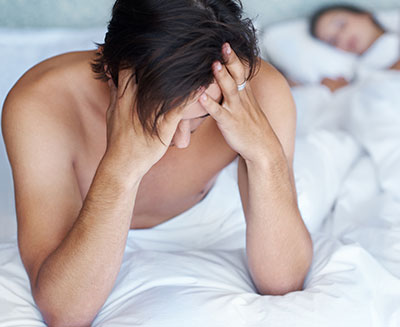What Is the Connection Between Testosterone and Libido?
There is a definite connection between testosterone levels, libido (sex drive), and sexual health issues in both men and women.
Libido, also known as "sex drive," is defined as your desire to have sex. Your libido is motivated by many factors, but hormones, particularly testosterone, play a significant role in your appetite for sex.
Testosterone plays a big part in your overall health, but perhaps its most meaningful role is to fuel sex drive and performance in both men and women. Low testosterone, particularly in men, can decrease your libido and your ability to have a satisfying sex life.
A decreased sex drive and erectile dysfunction are sexual problems in men that can occur from low testosterone. In women, low testosterone can lead to a lack of libido, painful intercourse, and most of the other sexual health issues reported by perimenopausal and menopausal women.
In either case, if low testosterone is the cause of your sexual health issues, testosterone replacement therapy can help.
Low testosterone is linked to sexual health issues in both men and women.
What Is the Connection Between Low Testosterone and Erectile Dysfunction?
There is a definite link between testosterone levels and erectile dysfunction (ED).
Medical research has shown that men with low testosterone experience a decreased sex drive or lack of libido. A decreased libido may not be a direct cause of ED, but the loss of interest in sex can certainly influence your ability to get or keep an erection.
Here is another interesting fact about testosterone levels and a man’s ability to perform sexually. A recent study published in Australia found that not having enough sex can actually decrease a man’s testosterone levels. The researchers found that particularly in men over 35, less sex and loss of libido are just as likely to cause low testosterone as the other way around!
We know that low testosterone leads to erectile dysfunction, decreased sex drive, and other sexual health issues in men. It is a biological fact that as men age and testosterone drops, so does their ability to perform sexually. We also know that testosterone is essential for normal erectile function.
The relationship between low testosterone and erectile function is a complex one. However, one thing is certain, men with low testosterone also are quite likely to, and usually do, also suffer from ED.
But that does not mean that their ED is directly caused by their low testosterone. In medicine, "correlation" does not always mean "causation." Low testosterone impacts a man’s health in several ways that can lead to ED. For example, men with low testosterone also tend to be overweight, have hardening of the arteries, and diabetes, all of which are known to contribute to ED.
In addition, men with low testosterone are also often weak, tired, stressed, and suffering from depression or anxiety — all of which can lead to erectile dysfunction and a lack of desire for sex.
Can Testosterone Treat Erectile Dysfunction?
While ED can occur at any age, it is more common in men over 40. Men over 40 also tend to have low testosterone. Testosterone is considered a “sex hormone.” A man needs testosterone for healthy erections and a normal sex drive. Unfortunately, a man’s testosterone drops as he ages.
Your testosterone level peaks at around the age of 20; after that, it starts a steady decline. By the time you reach the age of 40, you can expect your testosterone levels to drop by about 1% to 2% per year. That steady decline can lead to low testosterone, which causes several negative impacts on your health, not the least of which is ED.
With so many drugs and procedures currently available to help men with ED, no one is suggesting that testosterone replacement therapy should be used to treat erectile dysfunction. However, in men with low testosterone, we do know that testosterone therapy increases sexual desire and improves sexual performance. In fact, one of the first changes men see when starting testosterone therapy is an improved sex life.
According to a study recently published in the prestigious New England Journal of Medicine, testosterone therapy has been confirmed as being helpful in increasing sex drive in men with low libido. The study found that testosterone replacement therapy was effective in boosting mood and increasing sexual desire in men with sexual health issues.
The men in the study all had a self-described "decline in sex drive" and/or erectile difficulties. In interviews before starting testosterone treatments, they also reported being moody, depressed, and "unmotivated."
The lead researcher on the study Dr. Peter Snyder, of the University of Pennsylvania, concluded it was clear that "Testosterone improved sexual activity, sexual desire, and improved erectile function."
This study involved nearly 300 men over the age of 65 and was designed to observe the overall benefits of testosterone replacement therapy over the course of one year. Dr. Snyder said the biggest improvement observed in the group on testosterone therapy versus the placebo was improved sexual function.
Indeed, in our own practice, we have found that one of the very first benefits men see from testosterone therapy is an increased sex drive and improved ability to get and sustain an erection.
In men, low testosterone can lead to a lack of libido and erectile dysfunction.
Testosterone and Libido in Women
The benefits of testosterone for a happy and healthy sex life are not limited to men. Unlike men, who lose testosterone slowly over time, women experience a sudden drop in testosterone as they do their female hormones when they enter menopause.
We know that menopausal women experience issues of “female sexual dysfunction,” or FSD. The symptoms of FSD include vaginal dryness, lack of libido, loss of sensitivity, and painful intercourse. It was once thought that the sexual health issues experienced by menopausal women were due to the loss of estrogen that occurs in the post-childbearing years. However, current research indicates that it is more related to a drop in testosterone.
Can Testosterone Therapy Treat Sexual Dysfunction in Women?
The vaginal dryness, lack of libido, and painful intercourse that many women suffer during their perimenopause and menopausal years can all be helped by HGH replacement therapy. Also, as in men, HGH seems to have a positive effect on fertility in women.
Sharon Parish, MD, professor of medicine in clinical psychiatry and professor of clinical medicine at Weill Cornell Medical College, presenting the results of her research entitled, “How I treat women with testosterone deficiency,” to Endocrine Today said, “Among postmenopausal women and women who experienced surgical menopause or premature ovarian failure, studies show that low testosterone levels are closely correlated with reduced coital frequency and loss of sexual desire and researchers have observed a positive relationship between [increasing] free testosterone levels and the rating of sexual desire…”
Most of the sexual health issues experienced by menopausal women are related to testosterone loss.
The Complete Benefits of Testosterone for Sexual Health
The benefits of testosterone replacement therapy for sexual health are many. Testosterone therapy has been found to:
- Improve sex drive or libido (men and women)
- Provide a solution for ED (men)
- Boost sexual performance (men and women)
- Improved lubrication (women)
- Improved sensitivity (women)
- Less painful intercourse (women)
In addition to the above direct effects of testosterone on sexual performance, testosterone therapy can improve your sex life in a number of other indirect ways. Let’s examine some of the other factors that could contribute to a lack of interest in sex or poor sexual performance. Loss of libido and sexual performance issues are often caused by or at least accompanied by:
- Weakness
- Fatigue
- Depression and anxiety
- Mood swings
- Insomnia
Testosterone replacement therapy has been shown to help with all of the above. It only stands to reason that testosterone can help any man or woman between the ages of 40 and 65 who feel that their sex-life needs a boost!
Testosterone replacement therapy can improve the sex lives of both men and women.
Now that you know a little bit more about the link between testosterone, sex drive, and sexual satisfaction, why not take a minute to contact us and learn more about how hormone replacement therapy can improve your quality of life?





